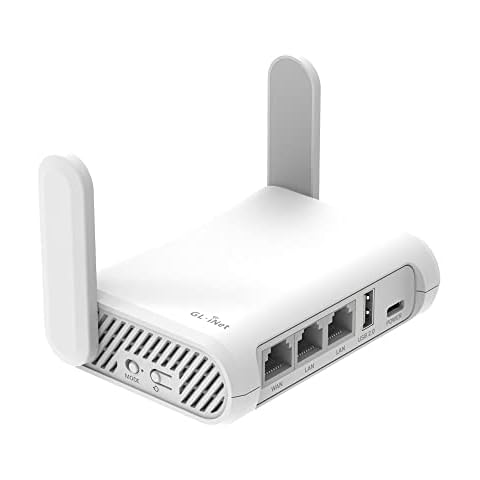A Guide to Choosing the Right WiFi Routers
Once the time has come to acquire a router, it is important that you consider a series of criteria. To make this task easier for you, which is often difficult, we have selected the ones we consider most important. We hope that they will guide you in your purchase to adjust as much as possible the quality and price ratio.
Connections and antennas
One of the first issues you should assess is the number of cable connections and the number of antennas you need. Whenever possible, it is better to connect the equipment by cable, since the connection is more stable. In that sense, current routers usually bring between two and four Ethernet LAN plugs. The best thing is that they are Gigabit LAN connections. On the other hand, if you are going to connect many computers via Wi-Fi and the house is large, it would be good if the router had several external antennas in different directions. If they are internal, make sure you have at least several.
Wi-Fi standard
A key aspect when choosing a router is the Wi-Fi standard it accepts. It will depend on the speed and ability to manage different connections. The most current standard is what is called Wi-Fi 6 or Wi-Fi 802.11ax. This standard offers 55% faster connections and many more connections at the same time.
Band
One of the most important features of routers is the band in which they operate. Single-band devices operate at a frequency of 2.4 GHz, dual-band devices do so at a frequency of 2.4 GHz and a 5 GHz frequency, and triple-band devices do so in a 2.4 GHz band and two 5 GHz bands.
The main advantage of double and triple-band equipment is that the 5 GHz band is less congested and has less interference. This is so since it is not occupied by other technologies such as Bluetooth connections.
MIMO Multiuser
It is a technology that is increasingly present in most modern routers. With it, one of the most normal problems in Wi-Fi connections, the multiple simultaneous connections, is resolved. Often, when several computers are connected to a traditional router, they can choose to send data to the devices one at a time.
However, with MIMO technology, the router sends information to several devices at the same time, thus greatly improving connection speeds. Thus, if there are normally many devices connected to your network, it is important that you make sure that you buy a router that has this technology.
Frequently Asked Questions (FAQs)
1. What does a Wi-Fi router do?
A Wi-Fi router is a device that provides wireless internet connectivity to devices in your home. It takes the internet signal from the modem and distributes it wirelessly to devices like computers, phones, and tablets, creating a Local Area Network (LAN) in your home.
2. How much does a Wi-Fi router cost?
The cost of a Wi-Fi router can vary widely. You can find routers priced anywhere from $20 to $500. However, the price alone doesn't determine the quality of the router. It's important to consider factors like features, performance, and reliability when choosing a router.
3. Do I need both a router and modem?
Yes, you need both a router and a modem to connect to the internet on multiple devices. The modem connects your home to the internet service provider, while the router allows multiple devices to connect to the internet through a single internet connection. Without both devices, you would only be able to connect one device to the internet at a time.
4. Does a Wi-Fi router give you better Wi-Fi?
The quality and performance of a Wi-Fi router can impact your internet speed. A newer and higher-quality router can help maximize your internet speed, while an older or lower-quality router may slow down your connection. Routers are responsible for managing and processing the devices on your network, so investing in a good router can improve your Wi-Fi experience.
5. Is it better to have a wired or wireless router?
In terms of performance, wired routers offer the best speeds. They typically have higher bandwidth (10/100/1000 Mbps) compared to the theoretical bandwidth of wireless routers, which is generally lower. However, wireless routers provide the convenience of connecting multiple devices without the need for physical cables. The choice between wired and wireless depends on your specific needs and priorities.
6. Can I buy just a Wi-Fi router?
Yes, most internet providers allow you to purchase your own modem and router separately. Alternatively, you can choose a device that combines both functionalities. It's important to note that if you opt for a combined device and one part (router or modem) breaks, you will need to replace the entire system. Purchasing separate router and modem gives you more flexibility in case of any issues or upgrades.
Editor's Notes
During our wifi router research, we found 24 wifi router products and shortlisted 10 quality products. We collected and analyzed 267,658 customer reviews through our big data system to write the wifi routers list. We found that most customers choose wifi routers with an average price of $128.37.
The wifi routers are available for purchase. We have researched hundreds of brands and picked the top brands of wifi routers, including TP-Link, NETGEAR, GL.iNet. The seller of top 1 product has received honest feedback from 384 consumers with an average rating of 4.7.
Mike Davis is a professionally trained electrician with six years of working experience in the electronics industry. He has written an array of web and mobile-based articles for e-magazines and blogs. He loves trying out some novel and popular gadgets and his expertise is in the areas of electronics and computers which is built over many years of working and personal experiences.











